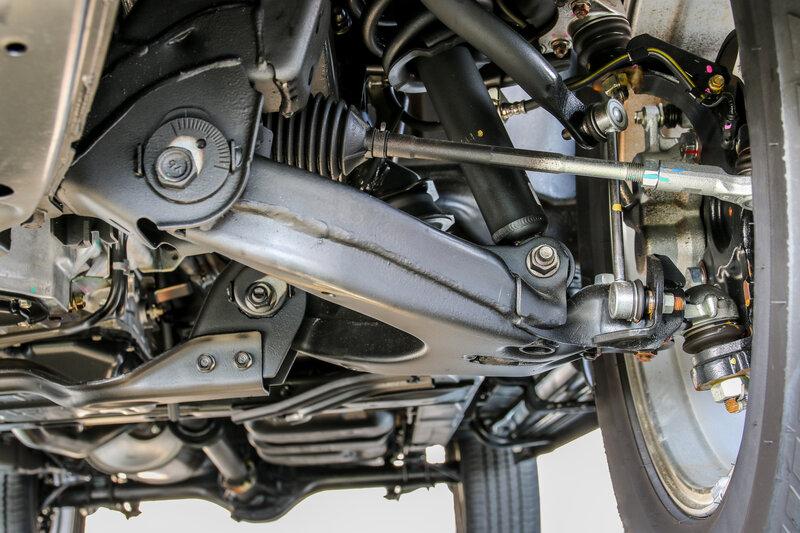 Each component of a vehicle plays a role in how it operates. One part may aim to increase security, boost power and speed, or improve handling and the smoothness of the ride. While all systems are important, some are more crucial, including the vehicle's suspension system.
Each component of a vehicle plays a role in how it operates. One part may aim to increase security, boost power and speed, or improve handling and the smoothness of the ride. While all systems are important, some are more crucial, including the vehicle's suspension system.
What does the suspension system in a vehicle do that’s so important? Rather than contribute to one aspect of better driving, the suspension system affects the vehicle’s safety, the driver’s ability to control it, and the quality of the ride.
To help drivers get the most out of their cars, trucks, and everything in between, we discuss the role of the suspension system below. We’ll also cover the types of systems that may need professional service from an experienced mobile mechanic in the Bay Area, like All Bay Diesel.
As your vehicle travels, it encounters bumps and other obstacles, both small and large. But each bump on the road surface comes into contact with the wheels and then exerts a vertical force on the vehicle. Without countermeasures, this force would cause the vehicle to fly upward, lose its traction on the road momentarily, and then slam back down with gravity.
So what does the suspension system in a vehicle do to prevent such occurrences? It optimizes the friction between the tires and the road. The suspension works by absorbing and dissipating the kinetic energy caused by driving over bumps, reducing road shock, and supporting the vehicle’s weight.
Your vehicle’s suspension system also reduces body roll while you’re cornering a curve. It does this by shifting some weight from the vehicle’s high side to its low side, maintaining traction between the vehicle’s treads and the road.
A quality suspension system within a vehicle is essential for a better overall driving experience. It improves four main aspects: handling and stability, safety and security, comfort, and the vehicle’s lifespan.
A suspension system maximizes the friction between the vehicle and the road. With more friction, the driver has better control over the vehicle, making it easier to handle and steer. The suspension system also maintains an even weight distribution, both between the front wheels and back wheels and between the right and left sides of the vehicle.
Handling goes hand in hand with stability. The more the driver can control the vehicle, the more stable its passengers and framework will be while it’s moving.
Every vehicle's first priority should be to safely and securely transport you to your destination. Without a suspension system, the people within the car, truck, or other type of vehicle shoulder a huge risk of injury. One road issue could jolt the vehicle up and down, causing the passengers to hit their heads or bodies on the vehicle’s surfaces or the driver to lose control.
How does the suspension system ensure a safer, more secure ride? By minimizing the impact of kinetic energy and keeping both the driver and their passengers secure.
When the suspension system absorbs force, it keeps the vehicle more stable. Instead of the vehicle bouncing up and down when it hits any road bump or imperfection, the suspension system keeps it as level as possible. This counterforce allows the driver and passengers to stay securely in their seats, which promises a more comfortable ride.
A working suspension system keeps any vehicle in better shape because it acts as somewhat of a shield. With protection, the vehicle and its components won’t face as much wear and tear. They’ll last for a longer period, delaying costly maintenance and repairs.
The suspension system is part of the vehicle’s undercarriage or chassis. Many vehicles utilize two suspension systems—one in the front and one in the back—that may work independently. Several components work together for suspension purposes, including the following:
What does the suspension system in a vehicle do without coil springs? Not much. These springs are absolutely vital in ensuring the vehicle remains stable and level when driving over uneven surfaces.
For example, as the vehicle drives over a bump, the tires take on the impact. The springs transfer these knocks to the suspension system, absorbing the upward motion of the tires and preventing the vehicle from bouncing.
Shocks or dampers work in tandem with the springs to absorb kinetic energy transmissions. They facilitate even greater shock impulse protection to help the tires maintain friction with the roadway.
Most modern suspension systems also have anti-sway bars, which stabilize the vehicle during turns and cornering.
The majority of vehicles in the Bay Area will have separate suspension systems (for the front and rear wheels). The front axle connects the two front wheels, while the rear axle connects the two rear wheels. These two suspension systems will be either dependent or independent.
What does the suspension system in a vehicle do? To recap, the suspension system absorbs shock impulses from the road, leading to safer, more stable, and much more comfortable driving. A well-maintained system will also extend the lifespan of the vehicle and its components by offering greater protection on the road.
Because of its vital role, it’s crucial to maintain the quality of your vehicle’s suspension system. The auto service experts at All Bay Diesel can inspect and repair these systems and others to keep your vehicle in amazing condition. Learn the signs of an engine problem here or call our Bay Area team at (925) 522-1780 to schedule service in California today!